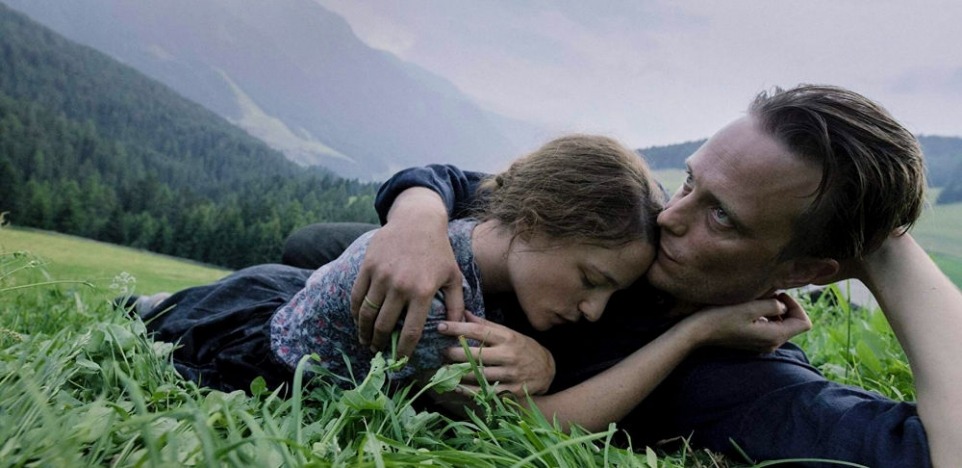Franz Jagerstatter (August Diehl) and his wife Franziska (Valerie Pachner) are hardworking farmers who live in a beautiful stretch of land in northern Austria. This film, inspired by true events, follows them through the years of World War II as he decides to make a stand against the Nazis, an act for which the real-life Jagerstatter was declared a martyr and beatified in the Catholic Church.
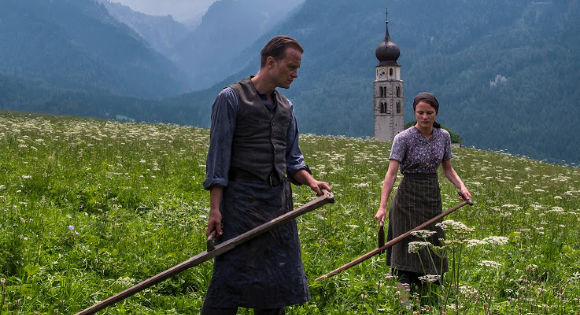
As the film opens, we see that Franz and Franziska are very much in love, reveling in the memories of their first meeting, joyous wedding ceremony, and years raising their three young daughters. The couple have a rewarding appreciation of the natural world and the simple life they share beneath the clouds. Their fields of grain, flowing water, and majestic mountains, captured in the breathtaking cinematography of Joerg Widmer, is a Garden of Eden for this devout Catholic couple.
But World War II and the Nazi annexation of Austria will soon destroy their happy existence. Convinced that the country needs farmers, they are hopeful that Franz will not be asked to fight. Their land is a solace and even a place to practice peace. We were reminded of Zen master Thich Nhat Hanh's antidote to war in his book Love in Action:
"The most important practice for preventing war is to stay in touch with what is refreshing, healing, and joyful inside us and all around us. If we practice walking mindfully, being in touch with the earth, the air, the trees, and ourselves, we can heal ourselves, and our entire society will also be healed. If the whole nation would practice watering seeds of joy and peace and not just seeds of anger and violence, the elements of war in all of us will be transformed."
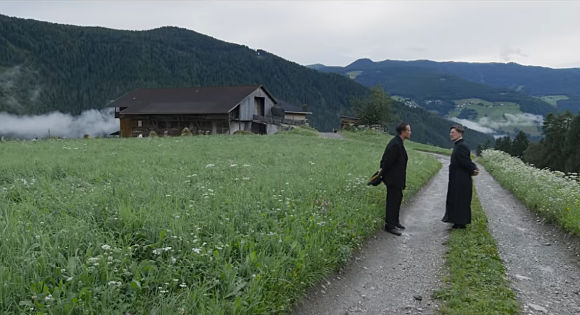
But much to the Jagerstatters' dismay, Franz is called up for service in the Austrian army. After training, he decides that he must follow his conscience and refuse to swear allegiance to Adolf Hitler. He tells his
local priest (Tobias Moretti) and the Cardinal (Michael Nyqvist) that since he has been given free will, he also has a responsibility to resist evil, and what Hitler and the Nazis are doing is evil. The churchmen counsel that by taking this stand he will be putting his life at risk and threaten the livelihood of his family. What's more, nobody will hear of his sacrifice, and it will therefore benefit no one.
The town's major (Karl Markovics) is even more vehement in his opposition to Franz' stand, calling him a traitor. A local artisan (Johan Leysen), who is restoring some paintings in the church, predicts that a dark time is coming when individuals will not battle with the truth, they will just ignore it. Everyone tries to convince him that his family will suffer too much. Franziska has to tend the farm with only her sister (Maria Simon) and mother-in-law (Karin Neuhauser) to help.
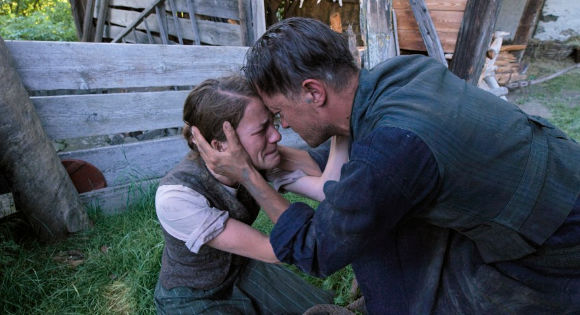
Franz's resistance leads to his being imprisoned. Back in the village, Franziska is shunned because of what her husband is doing. When he finally gets a trial, the judge (Bruno Ganz) seems to understand his position but nonetheless condemns him. Given one last chance to see her husband, Franziska tells him, "Whatever you do, whatever comes, I am with you always."
Mallick allows this story to unfold slowly and quietly, aided by the nature scenery which invites our lingering, and the beautiful musical score by James Newton Howard which invites our emotional involvement. Although Franz makes his conscientious objection early, he and his family do not learn its consequences and his fate for years. So it often is with resistance, this story mirroring so many others where those who oppose evil must persist and persevere against often overwhelming societal pressure. And like so many other conscientious objectors, Franz is supported not only by his family but also by his Christian faith.
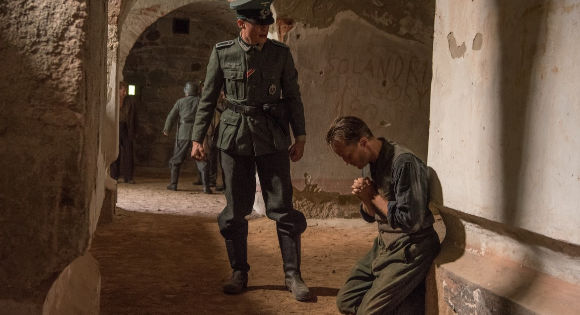
Going Deeper
Following are links to other articles on Spirituality & Practice that lift up the courage, commitment, beliefs, and activities of those who have taken stands, often at great personal expense, for peace.
American Friends Service Committee. Quakers founded AFSC during World War I to give young conscientious objectors ways to serve without joining the military or taking lives. The organization continues to this day to find ways of building peaceful communities.
Joan Baez. This American folksinger, songwriter, and activist founded Humanitas International Human Rights Committee. She has brought her influence to bear on issues of free speech, LGBT rights, desegregated schools, farm workers' rights, and countless other critical issues.
Daniel Berrigan. Berrigan's Essential Writings bring together the collected wisdom of this antiwar activist, priest, peacemaker, and poet. He said: "The only message I have to the world is: We are not allowed to kill innocent people. We are not allowed to be complicit in murder. We are not allowed to be silent while preparations for mass murder proceed in our name, with our money."
John Dear. This priest, peace activist, and author has been arrested repeatedly in acts of nonviolent civil disobedience for peace. In Living Peace, he writes, "The roots of war, violence, injustice, and the threat of global annihilation lie within each one of us. Unless we recognize our complicity in global violence, we can never accept God's gift of peace. If, however, we recognize, acknowledge, and confess the violence within us, we allow God to begin the process of our disarmament, first in our own war-torn hearts, and then in the world itself."
His Holiness the Dalai Lama. Violence & Compassion is a series of conversations on peace which notes that the Dalai Lama "believes that 'inner disarmament' is the best response to terrorism, ethnic cleansing, and the ever-present danger of nuclear war. He is a prime example of the practice of compassion — especially toward the Chinese who have destroyed his homeland and sent him into exile. 'Our enemy offers us a precious opportunity — to better ourselves,' notes this spiritual sage."
Dorothy Day. The youngest of Dorothy Day's nine grandchildren has written a rousing biography of this extraordinary peacemaker. In this excerpt she shares Day's views on conscience and sacrifice, including her understanding that "nonviolence is not as colorful and heroic as the life of a soldier, and the conscientious objector is often despised while the soldier is not. To speak out might mean losing your job or being treated with contempt or being jailed, beaten, or killed. It's a hard thing to set yourself against your church leaders, your political leaders, or your fellow man."
Mohandas Gandhi. Gandhi was not just a lawyer, a politician, an anti-colonial activist, and a social reformer; he was also a contemplative, a person of God, and a saint. This collection of his Essential Writings is a sturdy and enlightening resource that will school your heart, mind, body, and soul in peace, justice, and nonviolence.
Abraham Joshua Heschel. Abraham Joshua Heschel was a Jewish sage and moral prophet par excellence who taught that "if you want to know God, sharpen your sense of the human." This substantive collection of his Essential Writings acquaints us with his views on religion and race, awe, faith, prayer, and dissent.
Etty Hillesum. Etty Hillesum was a Jewish writer whose intelligence and gallantry amidst Nazi occupation of the Netherlands during WWII gives testimony to the best of the human spirit. This volume of her Essential Writings draws from her diaries, in which she wrote, "Through me course wide rivers and in me rise tall mountains. And beyond the thickets of my agitation and confusion there stretch the wide plains of my peace and surrender. All landscapes are within me. And there is room for everything. The earth is in me, and the sky. And I well know that something like hell can also be in one, though I no longer experience it in myself, but I can still feel it in others with great intensity. And that is as it should be, or else I might grow too complacent."
Rufus Jones. Jones had a full and active career as a Quaker mystic and social activist; among many other achievements, he founded the American Friends Service Committee, winner of the 1947 Nobel Peace Prize. His Essential Writings show how his Quaker understanding of life is more relevant now than ever given the perilous world situation.
Dr. Martin Luther King, Jr. As a Baptist minister, civil rights leader, and Nobel laureate, Dr. King's thirst for racial justice, nonviolence, and freedom made him a pioneer in breaking down barriers and building bridges on behalf of the poor and powerless. "Violence as a way of achieving racial justice is both impractical and immoral," he observed. "It is impractical because it is a descending spiral ending in destruction for all. The old law of an eye for an eye leaves everybody blind. It is immoral because it seeks to humiliate the opponent rather than win his understanding; it seeks to annihilate rather than to convert. Violence is immoral because it thrives on hatred rather than love. It destroys community and makes brotherhood impossible. It leaves society in monologue rather than dialogue. Violence ends by defeating itself. It creates bitterness in the survivors and brutality in the destroyers."
Thomas Merton. This Trappist monk was convinced of three things: war must be totally outlawed, war should be opposed by nonviolence, and nonviolence can be practiced in all arenas of life. "So instead of loving what you think is peace, love other men and love God above all," he wrote. "And instead of hating the people you think are warmongers, hate the appetites and the disorder in your own soul, which are the causes of war. If you love peace, then hate injustice, hate tyranny, hate greed — but hate these things in yourself, not in another."
Colman McCarthy. McCarthy's book I'd Rather Teach Peace consists of inspiring and prophetic journals the author kept during one semester of teaching peace education, including at a juvenile prison. A long-time peace activist and anarchist, he wrote a Washington Post column for decades and now directs the Center for Teaching Peace, a nonprofit organization that helps schools establish peace-studies programs. Anyone who reads this subversive and very spiritual book will be compelled to lend their voice, time, and financial support to organizations working for the noble causes of nonviolence, pacifism, and peaceful conflict resolution.
A. J. Muste. A clergyman, trade-union activist, and civil-rights leader, Muste served as Executive Secretary of the Fellowship of Reconciliation for more than a decade. His vibrant example of Christian nonviolence illuminated the value of holding fast to ideals regardless of consequences. "The way of peace is a seamless garment that must cover the whole of life and must be applied in all its relationships," he wrote.
Quakers. This paperback includes quotations from many famous Quakers and conveys the incredible difficulties in practicing peace in all arenas of life. it includes suggestions for practicing peace through visioning, loving enemies, nonviolent action, pacifism, conscientious objection, witnessing, patience, endurance, and hope.
Dorothee Soelle. Soelle was a German theologian who came of age during the rise of Nazi Germany and World War II. A professor of theology at Union Theological Seminary from 1975 to 1987, she embraced mysticism and saw justice and peacemaking as its natural expression, as reflected in this volume of her Essential Writings."Soelle's brand of radical Christianity finds connections between mystical experience and political activism, between suffering and resisting the status quo," writes editor Dianne Oliver. "She insisted that being Christian meant one needed to stand against the war in Vietnam and was adamant that any theology that allowed soldiers to work in the gas chambers of Auschwitz and still go to church on Sunday must have some serious problems."
Sophie Scholl. This compelling and deftly acted German film is based on the true account of an idealistic young German girl in Munich who stands out in history as one of the few nonviolent protesters against the Nazi war machine. A national icon in Germany, Scholl is a moral mentor for anybody seeking freedom and justice today. Her story illustrates the truth Dr. Martin Luther King, Jr., was getting at when he said: "Cowardice asks the question 'Is it safe?' Expediency asks the question 'Is it popular?' But conscience asks the question, 'Is it right?' " Conscience, we see in this stirring film, is the catalyst to personal and societal change, an interpreter of life, a spur to morality, and a cradle of hope.
William Stafford. Stafford, a poet and winner of the National Book Award, was a lifelong advocate of peace in a century of war. Every War Has Two Losers, a book assembled by his son from his father's daily writing practice along with many poems, has a remarkably direct bearing on the contemporary scene.
William Stringfellow. This radical lay theologian, human rights advocate, peace activist, and social critic was indicted for harboring Daniel Berrigan, the radical priest and peace activist. His Essential Writings cover Biblical, what it means to live in an age of empire, and how to be fully human. Stringfellow was convinced that racism was a demonic power. He would eventually write a lot about the principalities and powers that Christians must struggle with in their public and private lives.
Desmond Tutu. "Stability and peace in our land will not come from the barrel of a gun, because peace without justice is an impossibility," said the South African Anglican cleric and theologian known for his work as an anti-apartheid and human rights activist. The Words of Desmond Tutu is a substantive collection of his quotations.
John Howard Yoder. "Before it is a social strategy, nonviolence is a moral commitment; before it is a moral commitment, it is a distinctive spirituality," writes Yoder in this collection of his spiritual writings. Yoder, a Mennonite theologian, believed in a Jesus who demanded imitation in the form of replacing dominion with servanthood and hostility with forgiveness.
